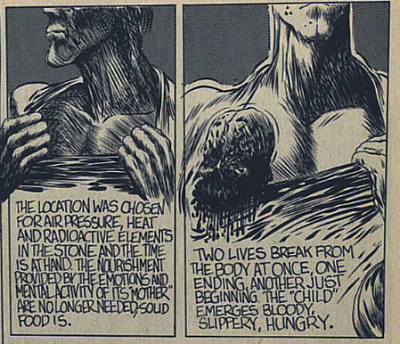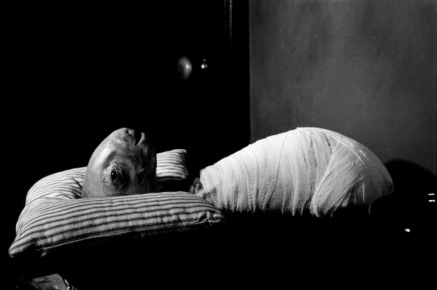In David Cronenberg’s Shivers (1975) a deranged scientist creates a parasite that enters the bodies of his apartment block neighbours thanks to the promiscuity of his young mistress. Spread by sex, the parasites begin to infect the entire building, causing their hosts to react violently against the remaining human occupants until, at the film’s closing, the city of nearby Montreal is at risk of infection and so too, presumably, is the world.
The film contains many Cronenbergian hallmarks: the ugly amalgamations and distortions of flesh, infection via sexual contact, and the uneasiness of eroticism, but it’s also familiar as another riff on invasionary paranoia à la Invasion of the Body Snatchers (1956) or a precursor of sorts to the paranoia and rending of flesh seen in John Carpenter’s The Thing remake (1982), or even as an adaptation of J.G. Ballard’s novel High Rise (also 1975). But Cronenberg himself was less interested in where his film’s influences came from or what they paralleled and was more concerned with where they were going — and they went, in his estimation, directly into 1979’s Alien.
“I have to say that some of my images like this [parasite] ended up in things like Alien, which was more popular than any of the films I’ve ever made. But the writer of Alien has definitely seen these movies, Dan O’Bannon. The idea of parasites that burst out of your body and uses a fluid and leaps on your face, that’s all in Shivers.”
~ David Cronenberg, David Cronenberg: Interviews with Serge Grünberg, 2006.
From the get-go Cronenberg expressed frustration with Alien. “It has no metaphysics, no philosophy,” he told Fangoria in 1979. “The creature winds up as a man in a crocodile suit who chases a bunch of people around a room. I think that my own films do a lot more in touching a deep seated nerve, more than the simple reaction that you don’t want a crocodile to eat you. Alien was just a $300,000 B-movie with a $10 million budget.” The pivotal chestburster moment also came under fire: “The parasite device isn’t used in a metaphorical way, it wasn’t used to evoke anything,”Cronenberg said. “In Alien, John Hurt has the parasite in him, he goes about his business as usual. In Shivers, the parasite stays inside the people and changes their behaviour and their motives. It’s used for something more than simple shock value.”
But Alien’s lack of philosophy bothered him less than the alleged plagariasm of its writer. “Dan O’Bannon knew my movie,” Cronenberg insisted in an interview with thefilmexperience.net. “In a case like that you wouldn’t mind a little credit for it. But beyond that, if you are influential –and I’ve had many young filmmakers say that I was a big influence and sometimes their movies do remind me of my old movies– you take it as a compliment. You obviously touched a nerve. It’s nice to have people be aware of that. But beyond that it’s inevitable; things become communal understandings, let’s say. The whole parasite thing. I mean there are movies called Parasite. But I did it first but, you know, whatever.”
Cronenberg often reiterated that he did not know and had never even met Dan O’Bannon, yet he was resolute that Dan had seen his films and deliberately plagiarised from them. His source, he revealed, was An American Werewolf in London director John Landis. “John Landis told me that [Dan] knew very well what he called ‘the Canadian films’, by which he meant Shivers and Rabid, when he wrote Alien. And so I know he stole all the parasite stuff from Shivers. And Ron Shusett said, ‘He never saw those movies and knows nothing about it’ … Dan O’Bannon later denied that he had ever seen those movies, but John Landis swears that he talked about them all the time and knew them very well.” Cronenberg has told this story several times, always referring to the oblique ‘Canadian films’ which he took to specify his own films. “I mean, everybody steals from everybody else,” says Cronenberg, “but he was apparently a very aggressive sort of hostile character. I don’t know, I’ve never met him.”
But Alien, though it certainly employed body horror (“a human subject dismantled and demolished,” Kelly Hurley defines it, “a human body whose integrity is violated, a human identity whose boundaries are breached from all sides”) merely uses it as a launching pad for its plot rather than as a fulcrum. The creatures in Alien and Shivers (home-grown experiments in the latter, of unknown alien origins in the former) are also quite distinct from one another. The facehugger in Alien is but one transitional stage of the Alien’s lifecycle; the parasites in Cronenberg’s film do not undergo metamorphosis: they slither from body to body in order to spread and survive, whereas the Alien can be more accurately described as a parasitoid or protolean being, defined by Wikipedia as creatures “that begin the growing phase of their lives as parasites, and in particular, typically as internal parasites. As a rule they end that phase of their lives parasitoidally by killing or consuming the host, and then they emerge as free-living adults.”
“As far back as Alien, for example, which totally ripped off things from my movie Shivers – Shivers featured a parasite that lives in your body, bursts out of your chests, jumps onto your face, and jumps down your mouth, and suddenly you see this in a studio film, which was hugely successful, Alien. The writer of the script, Dan O’Bannon, had seen Shivers, we know that he had seen my movie and, shall we say, appropriated it. So this is not new stuff for me.”
~ David Cronenberg, Collider, 2015.
The creation of the facehugger and chestburster has been covered extensively on Strange Shapes, along with the insect influence on the creature’s life-cycle. Dan’s Crohn’s Disease, undiagnosed but certainly afflicting him at the time, also influenced the Alien’s agonising birth process, as did the various comic strips that he had read in his youth, many of which featured alien spores erupting from human bodies to run amok.
Despite his distate for Alien, Cronenberg was approached by Fox to direct Alien Resurrection, an offer he found temporarily appealing. “It’s tempting for a minute because they’re begging me to do it,” he told combustiblecelluloid.com. “And it’s Fox, and I’d love to work with Sigourney Weaver and Winona Ryder. It’d be great fun. [But] the problem with doing a schlocky big-budget horror film or studio film is that it wouldn’t actually be fun for me. I’m innately honest, I think. If I’m gonna do Aliens 4, then I’m gonna deliver Aliens 4. I’m going to try and make it the best version of Aliens 4 I can. So I’m not going to try and subvert it and make it something else, because why spend $80 or $100 million of the studio’s money, and just be deceitful and be fighting them all the time, and have them combat at you, and then end up with something that isn’t really good either way … I actually said to them, ‘You know, I don’t even do sequels to my own movies; why would I do sequels to somebody else’s movies?’ I didn’t do The Fly II. Why would I do Aliens 4?”
There was another famed director by the given name of David who also, apparently, found O’Bannon’s film to be uncomfortably appropriative. David Lynch has never, to my knowledge, publicly spoken about Alien, but HR Giger, eager to work on Lynch’s adaptation of Dune after two failed attempts under Alejandro Jodorowsky and Ridley Scott, tried to reach out to Lynch in the early 80’s.
“Through friends I asked Lynch if he was interested in my co-operation,” Giger told Cinefantastique magazine. “I never heard from him. Later I came to know that he was upset because he thought we copied the chestburster in Alien from his monster baby in Eraserhead, which was not so. Ridley Scott and I hadn’t even seen that film at the time. If one film influenced Alien it was The Texas Chainsaw Massacre. I would have loved to collaborate with Lynch on Dune but apparently he wanted to do all the designs by himself.”
The Eraserhead (1977) baby, a sickly, mewling creature, is similar to the chestburster in that they are embryonic, apparently serpentine, monsters, but Lynch’s baby frightens because of the juxtaposition between its humanity and inhumanity: it is frighteningly monstrous and yet helpless. The relationship between the viewer and the baby is one of unease, disgust, and pity. No such relationship exists between the creatures of Alien and the film’s viewers: the Alien is an interloper that uses human bodies both brutally and impersonally.
“People have asked [Lynch] about me,” said Giger, “but he isn’t really enthusiastic about my work. I’ve been told that he thinks we stole his Eraserhead baby for the Alien chestburster, but that’s not true. I told Ridley Scott that he should see the film, though he never did. David Lynch said that it was filmed exactly as his was, but it couldn’t have been because Ridley hadn’t seen it! Lynch talked like it was some sort of homage to his work … He doesn’t seem to want to be friendly to me, and I don’t know why.”
Ever gracious, Giger, who took every given opportunity to exalt Lynch’s Blue Velvet or Twin Peaks, finished by saying: “I think he did a great job [with Dune]. I admire Lynch tremendously. I think he’s one of the greatest filmmakers and I would very much like to work for him some time.”




Hmm. Very interesting.
Alien is not meant to be metaphorical, beyond the pseudo sexual implications of GIger’s art. It’s not meant to be deep or rely on deep meaning nor anything than to evoke the most primitive instincts, a flight-fight response from the audience. Cronenberg, dismisses the avant-garde nature of Alien and the art which reflects two of the greatest Sci Fi Illustrators of the day, Ron Cobb and Morbius. Most of all Alien does does what successful movies are supposed to do: keep the watchers thinking about the story even after they’ve left the theatre.
I enjoy the work of both these directors immensely, but the notion that there’s some direct cribbing from their early films evident in Alien strikes me as something like paranoia/wishful thinking. Is anyone’s impression on viewing Alien ever, ‘Oh, it’s just that schtick from Shivers again, dumbed down and with a bigger budget’?
I find it interesting that Cronenberg dismisses Alien as inferior to his own output, apparently blind to the film’s incredible phantasmagoria of imagery, the remarkable nature of which has launched a thousand-and-one dissertations. The way he yaks on about “Aliens 4” almost speaks for itself, evidencing what little regard he has – or perhaps affects to have – for the series as a whole.
In fairness to David Lynch, if he really did imagine he was ripped off, it’s much cooler that he didn’t feel the need to air it in interviews like Cronenberg.
Though it’s inarguable that the Eraserhead baby is creepily fantastic, I can’t help but agree with the points made in your article. Clearly the psychological associations awakened in the viewer by Lynch’s creation are really quite distinct from those of ‘Kane’s son’.
As you say, the design evolution of the chestburster is pretty well documented, from Giger’s early Francis Bacon inspired turkey dinner nightmare, to Roger Dicken’s brilliant rendering of the adult in foetal form (apparently utilising the head section from his rejected Big Chap maquette, remodelled and paired with the facehugger’s tapeworm-like sectional tail).
Quite where in this process the Eraserhead baby might have intruded its wee smiling face by way of inspiration is hard to imagine, particularly as the sort of definitive influence Lynch reportedly felt it was.
The quotes you include from Giger on the matter are sad to read. His designs for the Jodorowsky incarnation of Dune are wonderful, and it would have been fascinating to see what else he might have imagined had Lynch included him in the later project.
Alas, this remarkable artist appears to have been treated poorly by Hollywood on quite a few occasions. His undaunted profession of admiration for Lynch’s work seems a clear testament to his character however.
On a more positive note, he did demonstrate some level of personal integrity in the way he discussed not using Alien 4 to create “his own movie”. I only mention it because with Disneys new Star Wars movies, I’m one of the crowd is feels quite sick to the stomach at the way the franchise has been re-purposed as some sort of idiotic and simplistic SJW wet dream series, with absolutely no regard to the movies that came before it.
I love both Lynch and Cronenberg.
However, the latter is wrong insofar that he misses that Alien is (at heart) cosmic horror; very different thematically from what he explores, and to that end I struggle greatly to see that it cribbed from his work in any capacity. Other than some patina of parasitism, I fail to regard any dotted lines between the works.
I hate to lower the level of discussion here, but Cronenberg’s comments really smack of jealousy and self-importance. Left a real sour taste in my mouth.
I, too, like Cronenberg, but he comes off as a jerk in these comments. Is her seriously claiming he’s the first person to think of an alien being as a parasite? Decades of scifi movies and books and stories say otherwise.
Let’s say he’s correct: So what? Ideas are not copyrighted material, it’s the form you put them in that is copyrighted. It’s like saying, “He made a movie to scare people, he got that from me.” As a poster above rightly said, has anyone ever seen ALIEN and thought, “They stole that from Shivers”?
And when I read things like “In Alien, John Hurt has the parasite in him, he goes about his business as usual,” I have to wonder if Cronenberg has even seen the movie. In my recollection, Hurt is attacked, goes into a coma, and when he awakes he is ravenously hungry–as a person would be who has been invaded by a parasite. He has all of a half-dozen lines of dialogue and maybe five minutes’ screentime before he dies. How that is business as usual for a character is beyond me.
I love both Cronenberg and Lynch, but the similarities they find are tenuous at best. Beyond a passing resemblance between the chestburster and that terror baby, the ‘Eraserhead’ comparison is outright ridiculous. And while perhaps ‘Shivers’ had some influence on O’Bannon, an accusation of plagiarism seems absurd.
Admittedly I’ve yet to see the film, but based off of Cronenberg’s own description I can’t help but notice that the plot of ‘Shivers’ seems to bear some very close similarities to William Castle’s 1959 film ‘The Tingler,’ if not in title then at least as far as parasites nesting in a human host until gestating and exploding out of their bodies. ‘Fiend Without a Face’ (1958) also features similar parasitic villains. Ultimately, the concept of a parasitic monster is simply not nearly as unique or original a concept as Cronenberg seems to believe. Indeed, I would assert that the plot and tone of ‘Alien’ owes as much if not more to ‘Planet of the Vampires,’ ‘Forbidden Planet,’ and ‘The Thing From Another World’ than to ‘Shivers’ for an isolated event in the first act of the movie.
Additionally, Cronenberg seems to be speaking out of both sides of his mouth here. He bemoans the similarities between films while complaining in the same breath that ‘Alien’ didn’t take full advantage of the parasite’s metaphorical significance. Frankly, I much prefer the unspoken phallic and vaginal imagery which laces the screen in ‘Alien’ from beginning to end to Cronenberg’s overt sexual obsession, and find the tired Freudian fears which so preoccupy Cronenberg to be much less potent than the time-tested fear of being eaten by crocodiles.
Talking about stealing stuff, there is a striking similarity between the famous exploding head scene in Cronenberg’s Scanners (1981) and the ending of Brian de Palma’s The Fury (1978). Actually, both movies deal with the subject of psychokinetic powers. Would Mr. Cronenberg care to comment please?